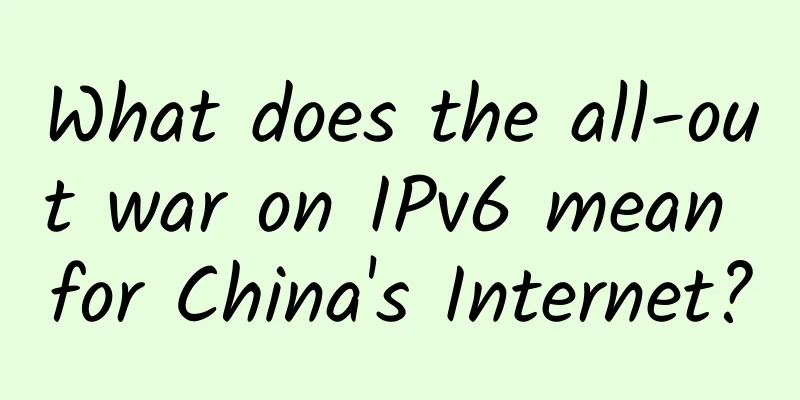What does the all-out war on IPv6 mean for China's Internet?

|
IPv4. What do you think of when you see these letters? Most likely, it was because they thought of the various tortures they experienced when setting up the IP address of their home computers. Some male students also thought of the pain and joy they experienced when they repaired the computers of girls.... But no matter what, we seem to have a consensus: these letters will always be in the computer, without being updated or modified. But in fact, these letters are not static at all. Changing them quickly is an invisible race - or even a war - hidden beneath the surface of Internet life. The so-called upgrade from IPv4 (fourth-generation Internet Protocol) to IPv6 has been called for many years. Today, this huge project is imminent. This is of course easy to understand. In the ZTE incident, we have seen how terrible it is to have basic technology in the hands of other countries. And every network device is using IPv4, which actually means that the lifeline of the Internet IP is also in the hands of other countries. Therefore, upgrading the Internet protocol has turned into a full-scale war that may affect the lives of tens of millions of people and the national economy. On November 26, 2017, the General Office of the Communist Party of China Central Committee and the General Office of the State Council issued the "Action Plan for Promoting Large-Scale Deployment of Internet Protocol Version 6 (IPv6)". Various telecom operators and Internet giants have announced their plans to promote IPv6 this year. Why this war should be fought and how to fight are the answers we want to find out today. IPv6: A battle we cannot afford to lose Many media and commentators use these three words when referring to China's IPv6: can't afford to lose. By the end of 2017, China had 772 million Internet users, accounting for one-fifth of the world's total number of Internet users; the level of Internet economy is second only to that of the United States, and the number of Internet users and industrial value are both growing rapidly. However, despite the prosperity, China's Internet economy is built on the condition that the underlying Internet protocols are all controlled by the United States and other countries. In the midst of the heated debate over chips, the embarrassing position of the Internet Protocol has not been recognized by the public. But this does not mean that it is not critical. In fact, in the communications and intelligence industries, the more basic things are, the more important they are. The Internet Protocol is directly related to a concept called IP capacity. IPv4, which has been used for more than 30 years, has a 32-bit address, which means that at most 2 to the power of 32 network devices can be connected to the Internet. However, with the explosion of mobile Internet and the Internet of Things, this number is far from meeting the demand for IP usage by devices. In fact, the distribution of IPv4 IP addresses ended several years ago, and telecom operators in various countries can only adopt a variety of alternative solutions to meet the IP needs of home users. Therefore, the battle to transform from IPv4 to IPv6 has at least four important implications for China's Internet: Escaping the IP Exhaustion Curse Currently, under IPv4 conditions, operators are unable to issue public IP addresses to individual users, which has caused many problems and brought a lot of inconvenience to life and the Internet economy. In the long run, there will even be a problem of IP exhaustion. With the arrival of IPv6, more than 1,000 addresses can still be allocated per square meter of the entire earth. Basically, the problem of address shortage can be solved once and for all, which is decisive for the future of China's Internet economy. Promoting real-name registration and new security mechanisms The current Internet real-name system, personal IP system cannot be improved, and DNS decoding is rampant. These are essentially hidden dangers caused by IP exhaustion. These problems have greatly increased Internet security risks and caused a lot of resource waste. IPv6 means that unlimited IP addresses can be issued, so all devices will have separate addresses, and many security issues and information traceability issues will be eliminated. Significantly improve Internet life and industry efficiency The construction of IPv6 can effectively improve the efficiency of end-to-end IP resolution and timely response services of Internet devices, making the era of zero-delay and zero-wait Internet truly come. It is also a major opportunity for a new round of Internet+ upgrades. Faster service response means better service quality. The Internet industry is of course very happy about this. No longer at the mercy of the United States, Japan, and Europe In the long-standing application of IPv4, there are 13 root servers in the world, 10 of which are owned by the United States, and one auxiliary server each in the United Kingdom, Sweden, and Japan. It can be said that domain names and IP, the foundation of Internet technology, are completely in the hands of the United States, which is a major loophole for national security. Upgrading to IPv6 means that China will have its own root servers and escape the dilemma of an IP war that suddenly breaks out one day. In summary, IPv6 is a battle that China cannot afford to lose, and it is the key to maintaining the foundation of the Internet economy and industrial advantages. As for the future, IPv6 is also the starting point of an eye-catching blitzkrieg. Because we all know that the era of the Internet of Things is coming. IoT Iron Curtain Opens: A Blitzkrieg That Should Be Won The era of the Internet of Things has been discussed for many years, but the era of the Internet of Everything and efficient collaboration between humans and machines has not yet arrived. This is of course determined by many reasons. The advent of technologies such as AI is bringing new opportunities to the IoT industry. However, another Achilles' heel of the IoT lies in the IP address issue. The addition of IoT devices will mean that the human world will suddenly see a surge in Internet devices. The essence of the Internet of Everything is that everything has independent IP operation capabilities and can complete end-to-end command control. However, under IPv4 conditions, communication manufacturers were surprised to find that there were not enough IPs to allocate to IoT devices. As a result, problems with data speed, mobile response, and even security, information traceability, and equipment replaceability followed one after another, leaving the entire industry with no choice but to dance with shackles. These conditions are almost impossible to achieve when IPv4 design resources are exhausted. Therefore, if we want to open the curtain of real IoT, we must cooperate with IPv6 to make IPv6's mobility, fast response, device security, and end-to-end IP connection capabilities become the norm, so that countless IoT devices can have room to stay. In addition to retail, IPv6 deployment in Internet of Vehicles, logistics and other IoT platforms is an important development direction. Taking the IoT embracing IPv6 as an example, we can find that the main force in this long march of network protocols has already emerged. Cloud computing and operators: countdown to the start of the battle IPv6 is a must and has great value. But it is not easy to implement. Migrating to IPv6 is a huge project, which involves network architecture adjustment, network equipment replacement, network protocol support, etc. It is not something that can be accomplished by a single entity such as the government, operators, or technology companies. It requires social coordination and overall scheduling. In this IPv6 migration, cloud computing platforms and telecommunications operators can be seen as strategic bridgeheads. Since cloud computing platforms are providing basic support for most Internet products and business models, the IPv6ization of cloud computing is also the basic engine of the entire IPv6 era. Operators are direct providers of IPv6, serving tens of millions of corporate and home users. At present, cloud computing brands such as Alibaba Cloud and Tencent Cloud, as well as operators such as China Telecom and China Unicom, have successively announced IPv6 solutions. The comprehensive Internet protocol upgrade should not be far away. Since IPv6 upgrade is a highly coordinated project, from the currently announced upgrade schedule, we can already see when IPv6 will enter our lives. Taking the three-step IPv6 plan just released by Tencent Cloud as an example, we can see that 2022 will be the time node for the final completion of the underlying upgrade: The first step is to provide a smooth and secure IPv6 Internet access before 2019, while also providing transparent 6to4 conversion services to access the underlying core network and existing network services, providing an opportunity for the Internet industry to transform towards IPv6. The second step is to gradually complete end-to-end IPv6 transformation by 2020. The all-out war for IPv6 is long and complex, and breaking free from the cage of lack of basic technology is never an overnight success. Fortunately, the clarion call has already resounded through the valley, and the sound of the decisive battle is certainly not far away. |
>>: Huawei awards the father of Polar code to pay tribute to basic research and exploration spirit
Recommend
China has 1 million 5G base stations. Why should 5G investment be moderately ahead of time?
I believe that many people are excited about 5G n...
This article illustrates the principles of Kubernetes network communication
[[275296]] Glossary 1. Network namespace: Linux i...
Cloud computing in 2018: Switch or die
Cloud computing technology is creating a new and ...
Huawei was named "Most Innovative Company" by Brand Eins and "Best Employer" by LinkedIn in Germany.
[Düsseldorf, Germany, March 22, 2018] Huawei was ...
BandwagonHost: CN2 GIA special price replenishment starting from $83.8/year, 2GB/40G SSD/[email protected]/multiple nodes optional
[Updated on February 27, 2024] Bandwagonhost has ...
5G keeps refreshing the timetable and the three major operators have finalized the roadmap!
5G has been constantly updating its timetable rec...
A chart showing the first phase 5G deployment schedule of the four major US operators
5G is accelerating. 3GPP has completed the non-st...
6 SD-WAN trends to watch in 2020
SD-WAN reached a new inflection point in 2019. Du...
Jack Ma summoned by Indian court! Alibaba's Wang Shuai: I couldn't find him after searching for a whole day
On July 26, foreign media reported that a court i...
Wuhan Aidi Group chooses Feiyuxing Wireless to achieve 30,000 square meters of warehouse coverage
Customer Introduction Wuhan Aidi Group Co., Ltd. ...
Juniper Networks' SD-WAN as a Service Reshapes Enterprise Branch Networks
On April 9, 2019, Juniper Networks, a provider of...
HostXen: US/Japan/Hong Kong 2G memory VPS monthly payment starts from 50 yuan, new users register to get 20 yuan
HostXen is a cloud server hosting platform that p...
Low frequency bands are used for 4G, but China Telecom and China Unicom still have a disadvantage
On December 15, the Ministry of Industry and Info...
How does 5G achieve beamforming?
Beamforming, as one of the core technologies of 5...
Operators set different network speeds for 5G packages: some are even worse than 4G
Not long ago, the Ministry of Industry and Inform...









